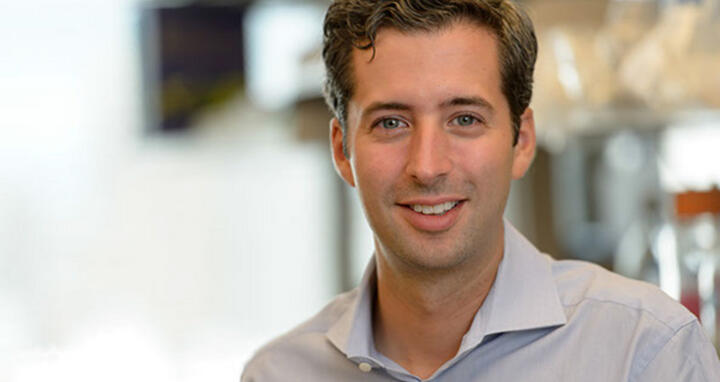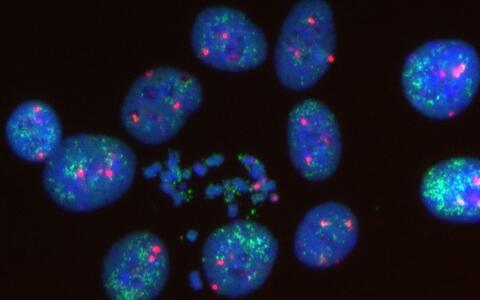Lord of the rings
Cancer is a typical disease of old age. Over the course of a person’s life, changes in the body’s genetic material accumulate in the cells and become increasingly difficult to repair. Eventually, the point is reached in which a cell begins to grow and multiply uncontrollably due to the mutations.
Why even children can develop cancer is a question that has occupied Dr. Anton Henssen for some time. The 35-year-old is a scientist at the Experimental and Clinical Research Center (ECRC), a joint institution of the Max Delbrück Center for Molecular Medicine in the Helmholtz Association (MDC) and Charité – Universitätsmedizin Berlin. Since 2019, he has been leading the Emmy Noether Research Group “Genomic Instability in Pediatric Cancer” at the Berlin-Buch campus.
Interest in circular DNA is new
Zirkuläre DNA
Just last September, Henssen received one of the coveted Starting Grants from the European Research Council (ERC) for his research. The ERC will provide Henssen with around €1.5 million over the next five years For the “CancerCirculome” project. “The importance of circular DNA in the development of cancer is increasingly becoming a focus of scientific interest,” Henssen says. He says that when he first started getting excited about the topic, things were quite different.
“That’s another reason why I’m now very pleased to receive the Kind Philipp Award for Pediatric Oncology Research,” says Henssen, who, in addition to his work as a scientist, also practices as a pediatrician in the Division of Oncology and Hematology at Charité’s Department of Pediatrics. “The award is one of the most significant in this country in the field of pediatric oncology.”
Tiny rings disrupt genetic information
Unfortunately, due to the coronavirus pandemic, the award ceremony will not take place until sometime later this year, says Henssen. However, the foundation has already transferred the prize money of €10,000 to him. “When the current crisis is over, I will go celebrate in a big way with my research group, without which I would never have received the award,” says Henssen, who participates in the Clinician Scientist Program of the Berlin Institute of Health (BIH) and Charité and is also a scientific member of the German Cancer Consortium (DKTK) at the Berlin site.
The Kind Philipp Award is presented each year to recognize the best work on pediatric cancer research by German-speaking authors. This time, the foundation gave the award to a study that was published in 2020 in the journal Nature Genetics. Together with Dr. Richard Koche from the Memorial Sloan Kettering Cancer Center in New York, Prof. Angelika Eggert, Director of the Division of Oncology and Hematology in Charité’s Department of Pediatrics, and 35 other researchers, Henssen showed in the publication that small DNA rings in children’s neurons can disrupt the genetic material in such a way that neuroblastoma develops.
Neuroblastoma growth accelerated
The award is one of the most significant in this country in the field of pediatric oncology.
In the study, the team examined tissue samples from 93 children with neuroblastoma. The group found that circular DNA is found much more frequently and in greater complexity in tumor cells than previously assumed. In addition, the scientists were able to use their data to deduce how certain sections of genetic information detach from a chromosome, form rings and subsequently reinsert themselves elsewhere on the chromosome. “Since the original sequence of genetic information is disturbed in the process, the affected cells can easily degenerate,” Henssen explains.
Together with his team, the researcher also showed that certain DNA rings accelerate the growth of neuroblastomas. Detecting them could soon make it easier to better assess the disease progression in children. Henssen’s next goal is to precisely sequence the circular genome and identify those factors which enable the rings to form and multiply in the first place.
In this way, the researcher and physician hopes to be able to help his young patients at Charité even better than he could previously. “If we develop markers for better diagnosis and prognosis,” says Henssen, “we will be able to offer children with cancer and their parents a much more individualized and presumably more effective therapy.”
Joint press release by the MDC, Charité and the BIH on the occasion of World Cancer Day on February 4
Text: Anke Brodmerkel
Further information
Portrait of Anton Henssen: The DNA artist
Press release: How circular DNA causes cancer in children
Contacts
Anton Henssen
Experimental and Clinical Research Center (ECRC)
of the Max Delbrück Center (MDC) and Charité – Universitätsmedizin Berlin
+49-(0)30-450-540395
Anton.Henssen@charite.de
Jana Schlütter
Editor, Communications Department
Max Delbrück Center for Molecular Medicine in the Helmholtz Association (MDC)
+49(0)30-9406-2121
jana.schluetter@mdc-berlin.de or presse@mdc-berlin.de
- Kind Philipp Award
-
-
The Kind Philipp Foundation for Pediatric Oncology Research, a member of the Stifterverband, presents each year the Kind Philipp Award for Pediatric Oncology Research. The award is given to recognize the best work on leukemia and pediatric cancer research by German-speaking authors. The award is endowed with €10,000. The award winner is selected by a review panel of the German Society for Pediatric Oncology and Hematology (GPOH).
Website of the Kind Philipp Foundation
- The Max Delbrück Center for Molecular Medicine (MDC)
-
-
The Max Delbrück Center for Molecular Medicine in the Helmholtz Association (MDC) was founded in Berlin in 1992. It is named for the German-American physicist Max Delbrück, who was awarded the 1969 Nobel Prize in Physiology and Medicine. The MDC’s mission is to study molecular mechanisms in order to understand the origins of disease and thus be able to diagnose, prevent, and fight it better and more effectively. In these efforts the MDC cooperates with Charité – Universitätsmedizin Berlin and the Berlin Institute of Health (BIH) as well as with national partners such as the German Center for Cardiovascular Research (DZHK) and numerous international research institutions. More than 1,600 staff and guests from nearly 60 countries work at the MDC, just under 1,300 of them in scientific research. The MDC is funded by the German Federal Ministry of Education and Research (90 percent) and the State of Berlin (10 percent), and is a member of the Helmholtz Association of German Research Centers.
- Charité – Universitätsmedizin Berlin
-
-
Charité – Universitätsmedizin Berlin is one of the largest university hospitals in Europe, boasting 3,001 beds and approximately 100 departments and institutes spread across 4 separate campuses. At Charité, the areas of research, teaching and medical care are closely interlinked. With an average of 15,550 members of staff employed Charité-wide and 18,700 from over 100 countries across its group of companies, Charité is one of the largest employers in Berlin. Some 4,553 of its employees work in the field of nursing, with a further 4,454 working in research and medical care. Last year, Charité treated 154,261 in- and day case patients, in addition to 700,819 outpatients. In 2019, Charité recorded a turnover of more than €2 billion, including external funding revenue and investment grants, setting a new record with €179.1 million in external funding. Charité’s Medical Faculty is one of the largest in Germany, educating and training more than 8,000 students in medicine, dentistry and the health sciences. Charité also offers 644 training positions across 9 different health care professions.
- The Berlin Institute of Health (BIH)
-
-
The mission of the Berlin Institute of Health (BIH) is medical translation: transferring biomedical research findings into novel approaches to personalized prediction, prevention, diagnostics and therapies and, conversely, using clinical observations to develop new research ideas. The aim is to deliver relevant medical benefits to patients and the population at large. As the translational research unit within Charité, the BIH is also committed to establishing a comprehensive translational ecosystem – one that places emphasis on a system-wide understanding of health and disease and that promotes change in the biomedical translational research culture. The BIH was founded in 2013 and is funded 90 percent by the Federal Ministry of Education and Research (BMBF) and 10 percent by the State of Berlin. The founding institutions, Charité – Universitätsmedizin Berlin and Max Delbrück Center for Molecular Medicine in the Helmholtz Association (MDC), were independent, member entities within the BIH until 2020. Since 2021 the BIH has been integrated into Charité as the so-called third pillar. The MDC is now the Privileged Partner of the BIH.







